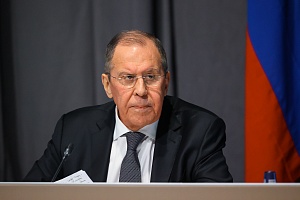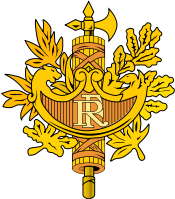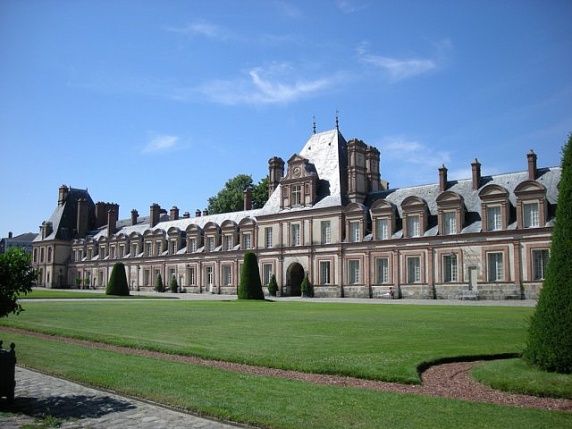 France (la République française)
France (la République française)
Foreign Minister Sergey Lavrov’s remarks and answers to media questions at a news conference following the 28th OSCE Ministerial Council, Stockholm, December 2, 2021
The current OSCE Ministerial Council is being hosted by Stockholm. I would like to thank our Swedish hosts, Sweden’s Foreign Minister Ann Linde personally, and her staff for the high-quality and creative organisation of our meeting in the conditions of force majeure, amid the pandemic. The offline meeting was very useful.
We held an in-depth and candid discussion on the state of OSCE affairs and the most topical and pressing items of this Organisation’s agenda. The situation in the OSCE is complicated, and it can even be called difficult. It reflects the negative trends taking shape in European security and cooperation. We are coming to realise that it is important to increase the relevance of the OSCE through joint efforts aimed at reinstating its role as a leading and unifying organisation in European affairs.
We expressed concern over the attempts of a number of countries to impose a number of concepts on all others, such as the “rules-based order” and effective multilateralism, which place a certain group of Western countries above everyone else and promote a discriminatory approach towards international affairs. We insist on the need to honour international law, which is a universal rule for all countries on our planet.
Military security in the Euro-Atlantic region continues to disintegrate. Only the Russian-US New START Treaty remains in force. Our American colleagues abrogated the Intermediate-Range Nuclear Forces Treaty and the Treaty on Open Skies. Everyone is concerned about this, although few parties dare state the real causes of this situation. They only regret the fact that these treaties have stopped working.
NATO continues to escalate the situation on our borders. The Alliance refuses to review our proposals for defusing tensions and preventing dangerous incidents. We have suggested specific measures on these matters. They continue to actively build up military potentials in Eastern Europe, including in close proximity to Russian borders. Every day, we hear vociferous statements threatening Russia. All this inevitably affects the OSCE’s activities. Against this backdrop, our remarks at the session and our contacts with our Western colleagues were mostly aimed at explaining and promoting the initiative of President of Russia Vladimir Putin which he voiced for the first time at an expanded meeting of the Foreign Ministry’s Collegium and repeated yesterday in the Kremlin at a ceremony of presenting the credentials of foreign ambassadors. This initiative notes the need to draft guarantees for preventing the further aggravation of the situation and stopping the creation of new threats for the Russian Federation. Specifically, the goal has been set not to allow NATO’s further eastward expansion or the deployment of new weapons systems on Russia’s western borders, which would threaten the Russian Federation’s security. The President of Russia underscored this aspect yesterday. Today, I stressed the fact that we are interested in agreements heeding security interests of all countries without exception. We don’t want any unilateral privileges. We will insist that these agreements be examined seriously, that they should not be shrugged off and rejected, as our Western colleagues have done many times. This includes their promises regarding the non-expansion of NATO. During the reunification of Germany, an agreement was reached with the German Democratic Republic that no military infrastructure would be deployed in East Germany. The same was stated in the Russia-NATO Founding Act and many other documents. The West ignored everything that took on the form of political obligations. Therefore, we insist that agreements mentioned by President Putin, whose conclusion we will demand, should be legally binding and obligatory for all parties. We will send the relevant proposals to our Western colleagues in the near future, and we expect them to treat this matter in earnest.
Of the other matters discussed at today’s session, the continued and exacerbated violations of the rights of ethnic minorities, mostly language and education rights, are causing concern. We are particularly alarmed over the trend to glorify Nazism and to falsify history, as well as attempts to hush up alternative viewpoints in the media, including the shutdown of undesirable media outlets.
The organisation that bears the name of Organisation for Security and Cooperation in Europe is torn by growing antagonisms and confrontationist rhetoric. Internal working processes are being hampered, and the political dialogue for whose purpose this Organisation was established is being complicated, making it impossible to reach compromises in obvious spheres where the interests of all participating countries coincide.
Here is an example. At this session, we and our colleagues from the Collective Security Treaty Organisation submitted a draft declaration on the need to prevent the use of the internet for terrorist purposes. Is there any matter that is as relevant today? Unfortunately, our Western partners withdrew this item from the agenda, without citing any arguments regarding the gist of our proposals. Obviously, they were dissatisfied with the fact that Russia had voiced this initiative.
A frank conversation is particularly important in these conditions. It is good that we have met face to face. This was very useful. All participants voiced their assessments of problems that have accumulated, and these assessments were heard. We can feel that there is an interest in overcoming this crisis and finding ways of increasing the OSCE’s efficiency.
The discussion on the developments in Afghanistan and their consequences for the OSCE region and Central Asia was also useful. We presented our approaches to this problem that had been agreed upon by the CSTO and the SCO when the two organisations had held a summit last September in Dushanbe. There is an entire list of specific practical steps to support the Central Asian countries and prevent an overwhelming migration crisis there, including to prevent terrorists from sneaking onto the territories of our allies, and many other measures. The SCO and the CSTO have special mechanisms and working groups for interacting with Afghanistan. Today we called on our colleagues from the OSCE to make sure that, when they develop their own plans, they consider the measures that are already being taken on the ground to help our neighbours.
We want to increase the effectiveness of the OSCE at combatting all transnational threats, terrorism, drug trafficking and organised crime. We want to see more frequent meetings of competent bodies – primarily, the counter-terrorism committee.
Many documents of this Ministerial Council meeting that were planned for adoption were eventually taken off the table. Some Western colleagues were unusually eager to fill these documents with radical and ultraliberal interpretations of gender concepts, whether it was appropriate or not. That does not do credit to our organisation. In the end, one document was adopted, a document concerning the OSCE’s involvement in the preparations for climate change. One decision was made, on the Transnistrian settlement. On the sidelines of the OSCE Ministerial Council, the foreign ministers of Russia, the United States and France, as co-chairs of the OSCE Minsk Group, adopted a statement on the Nagorno-Karabakh settlement that, among other things, welcomes the mediation efforts by the Russian Federation.
Certainly, we would like to see better results from this session, including a political declaration that has been on the agenda for more than ten years. But, instead of focusing on common European tasks to strengthen security in all its dimensions, everybody is trying to cram their small issues or references to some or other conflicts beyond the agreed version, into this political declaration.
We made a decision that Finland will take over the OSCE Chairmanship in 2025. It will be 50 years since the historic Helsinki Summit. Poland will be the Chair in 2022 and the next Ministerial Council will meet in Lodz.
We talked about Ukraine. All stances are known and they were publicly expressed. We raised the issues that directly concerned the OSCE, specifically, strict compliance with the Minsk agreements that had been approved by the UN Security Council and the mandate of the OSCE Special Monitoring Mission. The Minsk agreements and the OSCE Special Monitoring Mission mandate clearly stipulate a requirement for Kiev to have a direct dialogue with Donetsk and Lugansk. Unfortunately, the OSCE mission is not always objective about fulfilling its mandate.
I hope that the concerns we expressed during the general discussion as well as at the meetings with the OSCE Secretary General and the Chairperson-in-Office, the Foreign Minister of Sweden, will be heard.
I would like to stress once again that we are interested in the OSCE returning to the spirit of the Helsinki Summit and the foundation laid in 1975 that reflects the balanced interests of all the countries in this very important region without exception. Rather than ratcheting up confrontation, the OSCE should be working toward security and cooperation – it’s right there in the organisation’s name.
Question: US Under Secretary of State Victoria Nuland and CIA Director William J. Burns both visited Russia recently. They described the talks as fairly constructive. The United States posits one thing and then we hear different rhetoric. Are they playing a double game? What is Washington trying to achieve?
Sergey Lavrov: Not only before but also after these trips, when they comment on the upcoming or recent contacts as constructive, it still comes down to the idea that Russia “must.” For example, Russia “must” comply with the Minsk agreements.
Today US Secretary of State Anthony Blinken listed the requirements for Russia with respect to the Minsk agreements, including maintaining the ceasefire, withdrawing heavy weapons and ceasing economic interference in Donbass. During our bilateral meeting, I clarified everything, quoting specific clauses from the Minsk agreements that state that all these matters must be resolved through direct dialogue and consensus between Kiev, Donetsk and Lugansk. This obsession with tethering the whole of the Minsk agreements to Russia’s actions and conduct is characteristic of all NATO countries. There is also some exasperation when it comes to this matter.
We had a rather professional conversation with Mr Blinken, including on Ukraine. The Americans are willing and ready to help with fulfilling the Minsk agreements. Although we can see that their interpretation is completely different from the actual wording. However, we believe that the US capabilities can be helpful. It is the United States that has the most influence with the Kiev regime. At the same time, Washington claims that it is not seeking to undermine or expand the Normandy format but would like to use its bilateral opportunities in its contacts with the parties involved. We have no objections to that. From the beginning, we need to agree on the fundamental terms of our interaction. And the only possible terms consist of a direct interpretation of the Minsk agreements. There is no need to even interpret them. All it takes is reading and doing what is written.
Considering the growing criticism directed at Russia, we distributed the text of the Minsk agreements and the Declaration of the leaders of Russia, Ukraine, France and Germany among the participants of the OSCE meeting. These documents had been approved by a UN Security Council resolution. I directly asked our colleagues to carefully read these documents before they comment on Ukrainian affairs. Then many would realise that they should choose different rhetoric. We are ready for any and all contacts, and we are not evading anything. It is important to understand the ultimate goal.
Question: Do you regard the deployment of warships in the Black Sea and the deployment of military equipment on the border with Donbass as links in the same chain? What can this lead to? How dangerous is this situation?
Sergey Lavrov: The goal is the same: the containment of Russia. It has been openly declared and is being translated into practice, including with regard to the activities you have mentioned in your question.
We have reminded our Western colleagues that for over two years they have refused to discuss the proposals submitted by the General Staff of the Russian Armed Forces to the NATO countries. First of all, we proposed establishing a distance from the contact line within which our and NATO drills must not be held. Second, we proposed setting the nearest approach distance for our combat aircraft and warships. And third, we proposed coordinating additional air safety measures in the Baltic Sea, primarily arrangements for combat aircraft making fights with their transponders on. NATO colleagues refused to do it.
These practical proposals are proof of our sincere desire to de-escalate tension. Refusal to discuss them lays bare the empty talk about the alleged Russian refusal to cooperate with NATO and to coordinate confidence-building measures. We will continue trying to make our voice heard. Our main goal is our security. If the NATO countries continue to avoid discussions on this issue and refuse to discuss the ideas put forth by President Putin, we will take measures to ensure that our security, sovereignty and territorial integrity do not depend on anyone.
Question: What if the United States and its allies refuse to discuss Russia’s demands for security guarantees? What will happen then? Do you have a Plan B?
Sergey Lavrov: We do not demand security guarantees. President Putin has pointed out that there must be collective guarantees of each other’s security, for all parties to the common European process. I wouldn’t like to guess what will happen if the West refuses to discuss them. Everyone has heard what President Putin has said and knows that our proposals are serious. We are putting them on paper now. We’ll see what their reaction is.
We need to gauge the seriousness of the Western community, to see if it is seriously interested in de-escalating tension and putting an end to the unilateral attempts to build up its advantages, including in terms of military infrastructure, the armed forces and military equipment.
Question: US Under Secretary of State for Political Affairs Victoria Nuland has stated that if Russia took steps to destabilise Ukraine, sanctions would be applied against Moscow that have never been used before. Can you comment on this? Will Moscow respond to such sanctions?
Sergey Lavrov: Regarding Nuland’s statement, [Secretary of State] Antony Blinken and several other delegates, including Germans, issued similar warnings about sanctions unlike anything before. There’s always a first time. There were other sanctions they refrained from taking in the past.
Our Western colleagues have lost the culture of dialogue and diplomatic negotiations, and the ability to look for consensus and a balance of interests. If something goes against their grain, they promptly impose sanctions, and not only against Russia. The West almost always threatens and imposes sanctions on countries that refuse to share its unequivocal approaches. I hope that this is not the deplorable proof that the West has lost the ability to negotiate, but only evidence that the Russophobic trend is preventing NATO and the EU from doing practical work, abandoning confrontation and getting down to what the OSCE was established for.
If new “high-pressure” sanctions are imposed on Russia, we will react to them. We will have to. How will we respond? Time will show. I would not like to guess what the West will do. They are threatening new financial and sectoral repressions. This is a path to nowhere, which will ultimately boomerang on the initiators of illegal unilateral measures.
Question: You and US Secretary of State Antony Blinken discussed the operation of diplomatic missions. You agreed that experts should continue their work. Does this mean that the expulsion of Russian diplomats will be suspended? When will experts hold their meetings, if any? Can these meetings take place before the year is out?
Sergey Lavrov: We reminded our colleagues that the “spiral” of mutual restrictions, launched by Barack Obama several days before leaving the White House in order “to spite” Donald Trump and to leave this “legacy” to him, has already gone too far. This is unacceptable, and it violates all conceivable diplomatic standards and conventions. The Americans have seized Russian diplomatic properties, and they still retain control over them. Although we own them, we are not even allowed to enter the premises. They do not deny the fact that we own these facilities, but they do not allow Russian representatives to visit them and to assess their condition.
The United States imposed unilateral restrictions, in violation of all diplomatic conventions, limiting Russian diplomats to working for no more than three years on US territory. They explained to us that this was standard practice. We replied that our standard practice was not to recruit local personnel. The US mission in Russia had over 400 Russian employees. We terminated this US “right” in line with this American logic. We entered a vicious circle. We cannot help but respond, so as not to provide them with unilateral advantages. I hope that our American colleagues will realise that it is not in the interests of the United States and Russia to let this situation persist.
Expert consultations started under an agreement between Presidents Vladimir Putin and Joe Biden in Geneva this past June. Yet another round is scheduled to be held either in late 2021 or in early 2022. So far, we do not see that our negotiating partners are ready to take constructive steps. We have submitted certain proposals. Ideally, all restrictions will be lifted, and the normal and mutually respectful work of diplomatic missions will resume. I confirmed this during our conversation with Antony Blinken.
Question (retranslated from English): Today, you have talked about Georgia and its desire to become a NATO member. Could you comment on yesterday’s statement by President of Russia Vladimir Putin about the expansion of NATO? Does this present a threat? What do you think about relations between Russia and Georgia?
Sergey Lavrov: I know the mantra which NATO members are repeating. NATO Secretary-General Jens Stoltenberg recently said that only NATO, Ukraine and Georgia would decide whether these countries should join NATO or not. No one has the right to interfere. This is the declared position of a specific group of countries.
I would like to recall that international law has other universally recognised postulates. The basic postulate is that every state has a complete right to choose how best to protect its legitimate security interests, sovereignty and territorial integrity. In this case, there is a pledge, signed at the top level by all Western partners, Ukraine and Georgia, that security is indivisible. No single state has the right to seek security at the expense of others.
Some time ago, we suggested codifying these top-level political statements and declarations and making the indivisible security principle legally binding. We submitted the relevant draft treaty to OSCE member countries for consideration. NATO colleagues flatly refused to discuss it and offered an interesting argument while explaining their position. They stated officially that legally binding security guarantees can only be provided to NATO members. We inquired what should be done if their leaders, presidents and prime ministers have signed a political commitment. Does this mean that their word is worth nothing? We received no answer.
A mentality saying that certain countries should either stick with NATO or Russia began to show itself in the 1990s. Today, it is manifested in NATO’s position regarding the principle of indivisible security. This is yet another attempt to divide Europe and to involve as many countries as possible in NATO. Quite soon, NATO will be unable to absorb them all. Instead of enhancing security, the Alliance is becoming less monolithic in terms of its original task, namely, territorial defence. Many of the newly acquired Eastern European countries have diminished, rather than increased, NATO’s ability to be a combat-ready entity and to actively defend itself.
Saying that you will join, all else be damned, is not a sustainable position. You have to think about principles that all of us have supported and proclaimed. We compromised when the Soviet Union had to assume obligations in the field of human rights. Today, NATO members can see that they need something more, and that it is necessary to deter and contain Russia by military means. This is not fair. We suggested going back to the pillars of the OSCE, namely, equality, consensus, dialogue and indivisible security. I am convinced that Georgia will feel comfortable inside this system.
















